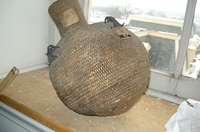John Wesley Powell by Nina Weissbach
John Wesley Powell was a United States soldier and geologist who spearheaded modern ethnology in America. Later in his career, as a Professor at Illinois Wesleyan University, he, his wife, and several students embarked on a three month trip traveling down the Green and Colorado Rivers. They made stops along the way collecting data, recording their observations and acquiring objects. Powell’s biggest direct contributions to the research of indiginous peoples were done during this period. Some of the pottery the Powells acquired reside in our collection at Lafayette College today.
Despite the time he spent with indiginous peoples, Powell ironically, pushed the government for funding to aid in the “civilization” of said people. This money would ultimately be put toward teaching English, Christianity, and Western farming and manufacturing methods. He is also credited with having coined the term, which is now used to describe the type of work he did, “acculturation”, which means assimilation to a different culture, typically the dominant one. It is shocking, and even saddening, to know that many of those who significantly contributed to what we know about indiginous peoples were actually working to eliminate those groups' cultures. Therefore, while Powell’s work may not have been as progressive as one would think initially, we must also remember that the entire field of anthropology was inspired by the trends of colonialism and adventurism.
Powell is immortalized for his influence on modern American anthropology during his time as the first Director of the Bureau of Ethnology at the Smithsonian Institute. He furthered the US Geological Survey and linguistic, sociological and anthropological ethnology, all of which revolutionized the field as a whole.
